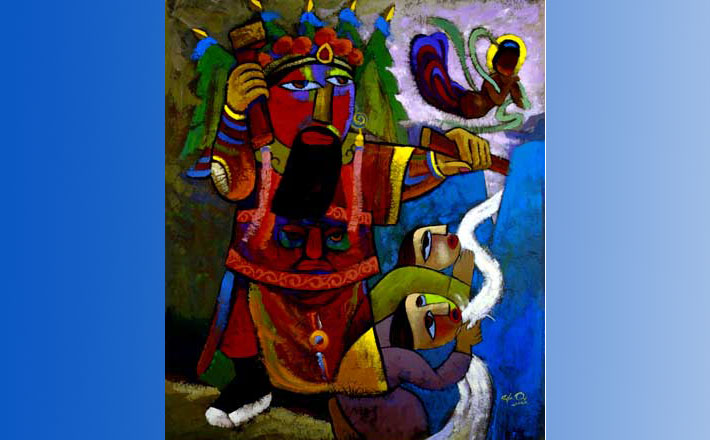Commentary on Ezekiel 18:1-4, 25-32
The word that comes to the prophet Ezekiel in today’s lesson is an argument between God and the exiles.
Having listened in on the exiles’ talk, God asks Ezekiel what their use of a proverb might mean: “The parents have eaten sour grapes and the children’s teeth are set on edge.” The exiles are “proverbing a proverb,” either applying an existing saying to their present situation, or creating a new one. Its meaning is clear: children suffer from their parents’ mistakes.
As proverbs go, this one is memorable if only because it rings so true. Who has not mourned a parent’s limitations, or struggled against some lingering psychic injury from childhood? What the exiles mean by applying it to themselves is the problem. Not only does it allow them to blame others for their current plight, it also obscures the particulars of the current emergency.
While it is certainly true that the Babylonian exile is the end result of a long series of rebellions (as Ezekiel will argue elsewhere), it is the current rebellion that now jeopardizes the kingdom of Judah. One is reminded of David’s blasé remark on learning the news of Uriah’s death in battle: “Do not let this matter trouble you; the sword devours now one, then another” (2 Samuel 11:25).
According to David, Uriah has died because war happens, not because David has had anything to do with it. Similarly, by identifying with the children in the proverb, the exiles cast themselves as innocent victims, as if Nebuchadnezzar’s deportation had not singled out those responsible for the rebellion. In the course of the argument, God urges the exiles to acknowledge their own guilt, repent, and live. The question to consider is how rejecting the proverb is a necessary step.
Commentators often draw connections between this proverb and the ancient Israelite understanding of intergenerational responsibility for guilt (see Exodus 34:7), and suggest that Ezekiel 18 marks a breakthrough to a supposedly higher understanding of individual moral responsibility. Although there are good reasons to challenge that reading, personal responsibility is nevertheless a key theme of the chapter.
It is first articulated in God’s initial rejoinder to the proverb, which establishes a close connection between guilt and punishment: “it is only the person who sins that shall die” (18:4). This connection is developed in two stages. First, conventional assumptions about intergenerational guilt and punishment are carefully dismantled through the examination of the fates of the righteous father, the wicked son, and the righteous grandson. Neither guilt nor righteousness is carried from one generation to the next; only the wicked one dies (18:5-18).
In the second stage, the disputation examines the careers of righteous and wicked individuals. A righteous person can turn to wickedness and lose his life; conversely, a wicked person can turn to righteousness and live (18:19-24). Even within a single lifetime, then, one’s past doesn’t necessarily determine the future. If the generations are not bound to suffer because of the sins of the ancestors, neither does an individual’s past guilt condemn him to a life of punishment.
But if Ezekiel 18 is only about guilt and punishment, it’s worth asking why God emphatically declares ownership over all life “Know that all lives are mine; the live of the parent as well as the life of the child is mine” (18:4a). Is this declaration only for the sake of justifying God’s right to kill the wicked? This would seem not to be the case, since God emphatically repudiates any pleasure in the death of anyone, even sinners (verses 23, 32). Indeed, as the argument unfolds, the more pressing question is not who gets punished, but whether it is possible to imagine life after guilt. If God does not desire the death of anyone, not even the wicked (verse 32; cf. verse 23), then what are sinners to do?
They must let go of self-justifying but limiting ways of seeing themselves. In Ezekiel 18, this means letting go of the proverb. Remarkably, the exiles cling to it even after God establishes that only the wicked suffer for their sins (18:5-18). One would think this is good news; yet in v. 18 the exiles protest, “Why should not the son suffer for the iniquity of the father?”
Apparently identifying with the children of the proverb, the exiles would prefer to see themselves as victims than as moral agents capable of choosing their destiny. They object yet again when God declares that even the wicked may live by turning from their wickedness. They protest, “The way of the Lord doesn’t measure up” (CEB; compare NRSV: “the way of the Lord is unfair”). The translation in NRSV suggests that the protest revolves around questions of divine justice; the translation in CEB may be more accurate: the exiles protest God’s unfathomability — as if they prefer the tidiness of a self-limiting proverb to the mystery of God’s offer of new life.
The disputation makes God’s way perfectly clear. God values life above all else. Therefore God is open to human repentance and change. By contrast, the proverb relegates its users to an endless cycle of suffering by encouraging them to re-inscribe old patterns of guilt and blame. What God offers instead is life grounded in truth telling and responsibility. Mom and Dad may in fact have made a mess of things, but the children have eaten their fair share of sour grapes.
Somewhat paradoxically, accepting responsibility for guilt also makes it possible to let it go; this is conveyed quite literally in God’s challenge to the exiles to “cast away” their transgressions (verse 31). Repentance is not a matter of bearing guilt as a burden, neither is it the cultivation of remorse or regret. Instead, is the first step toward transformation — what Ezekiel calls getting a new heart and a new spirit. Repentance is an active, deliberate step in a new direction. It is a step into the future, into life itself.


September 28, 2014